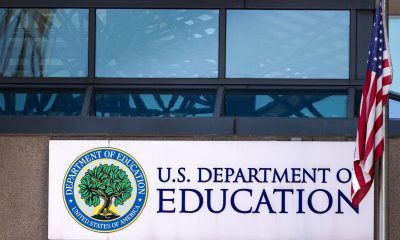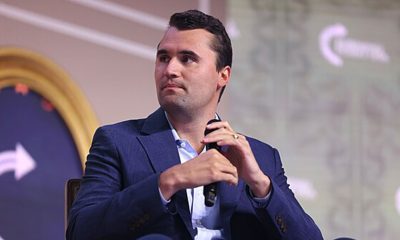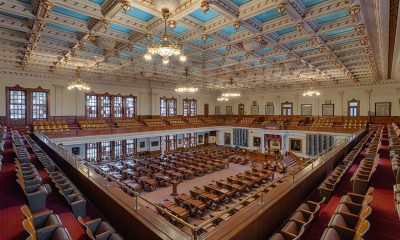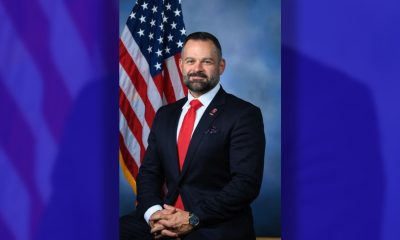Activism
The Lookout: What You Should Know About California’s New Gun Laws
On Oct. 10, Newsom scored another win on gun control. The Ninth U.S. Circuit Court of Appeals ruled that the California state law that bans guns with high-capacity, detachable magazines can remain in effect while California appeals a U.S. Circuit Court of Appeals September ruling that declared that law unconstitutional.

By Tanu Henry and Antonio Ray Harvey, California Black Media
Last month, Gov. Gavin Newsom signed new legislation enhancing gun safety measures, further solidifying California’s position as a national leader in implementing controls on the use and distribution of firearms.
Joined by Attorney General Rob Bonta, lawmakers, gun safety advocates and gun wound survivors, Newsom introduced at a press conference several of the gun laws he signed.
They included Senate Bill (S.B.) 2, authored by Sen. Anthony Portantino (D-Burbank), which reinforces the state’s public carry regulations; and S.B. 452, authored by Sen. Catherine Blakespear (D-Encinitas), which mandates the use of microstamping on handgun cartridges to help trace guns used in crimes.
S.B. 2 imposes new restrictions for obtaining a concealed-carry weapons (CCW) permit. According to Portantino’s office, the law ensures licensees are law-abiding citizens over 21 years of age; establishes an appeal process for denied CCW licenses; introduces gun handling, loading, unloading and storage training requirements; and restricts locations where people can legally carry firearms.
In 2022, California’s gun death rate was 43% lower than the national average, according to the Centers of Disease Control (CDC). The Giffords Law Center also ranked the state number one in the United States for gun safety.
“While radical judges continue to strip away our ability to keep people safe, California will keep fighting — because gun safety laws work,” Newsom said in a Sept. 26 statement.
Newsom also signed bills introduced by California Legislative Black Caucus (CLBC) members Mike Gipson (D-Carson), Kevin McCarty (D-Sacramento) and Reggie Jones-Sawyer (D-Los Angeles).
Assembly Bill (A.B.) 1406 (McCarty) gives the California Department of Justice the authority to postpone firearm delivery if additional time is required to do background checks.
A.B. 1089 (Gipson) adds new regulations and guidelines for the ownership and operation of computer numeric control milling machines, commonly used to manufacture “ghost guns.” Ghost guns are untraceable firearms sold in parts and assembled at home.
A.B. 574 (Jones-Sawyer), which goes into effect in March 2025, requires gun dealers making any sale of a gun — or overseeing the transfer of ownership — to confirm that both the buyer and seller “confirm possession of every firearm they own or possess.”
A.B. 28, which is authored by Assemblymember Jesse Gabriel (D-Encino), was also on the list of gun legislation Newsom approved. The law imposes an 11% excise tax on gun vendors and gun manufacturers across the state. The revenue collected will be used to improve school safety, behavioral health and gun violence intervention.
“How about a little damn accountability,” said Newsom at a press conference. “You’re selling a product, a leading product, a purveyor of death for our kids.”
Gabriel shares the Governor’s perspective. “It’s shameful that gun manufacturers are reaping record profits at the same time that gun violence has become the leading cause of death for kids in the United States,” he said.
The same day Newsom signed the package of gun laws, the Firearms Policy Coalition (FPC), a non-profit focused on advancing gun rights, announced that it filed a complaint challenging some parts of S.B. 2.
“SB2 restricts where persons with licenses to carry a concealed weapon may legally exercise their constitutional right to wear, carry, or transport firearms. And it does so in ways that are fundamentally inconsistent with the Second Amendment and the Supreme Court’s decision in Bruen,” the complaint states.
Three groups — Orange County Gun Owners, San Diego County Gun Owners, and California Gun Rights Foundation — have joined FPC in the lawsuit.
“With Gov. Newsom’s signing of SB2 today, California continues to exhibit its disdain for the rights of Californians, the U.S. Constitution, and the Supreme Court’s Bruen decision,” said Cody J. Wisniewski, FPC Action Foundation’s General Counsel and Vice President of Legal, and FPC’s counsel. “Unfortunately for California, and contrary to Governor Newsom’s misguided statements, the state does not have the power to unilaterally overrule individual rights and constitutional protections.”
Bonta disagrees. “Addressing gun violence is critical to protecting public safety; we cannot pretend that they are distinct problems,” he said. “In California, we won’t settle for inaction when it comes to saving lives.”
On Oct. 10, Newsom scored another win on gun control. The Ninth U.S. Circuit Court of Appeals ruled that the California state law that bans guns with high-capacity, detachable magazines can remain in effect while California appeals a U.S. Circuit Court of Appeals September ruling that declared that law unconstitutional.
Activism
Oakland Post: Week of November 26 – December 2, 2025
The printed Weekly Edition of the Oakland Post: Week of November 26 – December 2, 2025

To enlarge your view of this issue, use the slider, magnifying glass icon or full page icon in the lower right corner of the browser window.
Activism
Oakland Post: Week of November 19 – 25, 2025
The printed Weekly Edition of the Oakland Post: Week of November 19 – 25, 2025

To enlarge your view of this issue, use the slider, magnifying glass icon or full page icon in the lower right corner of the browser window.
Activism
IN MEMORIAM: William ‘Bill’ Patterson, 94
Bill devoted his life to public service and education. In 1971, he became the founding director for the Peralta Community College Foundation, he also became an administrator for Oakland Parks and Recreation overseeing 23 recreation centers, the Oakland Zoo, Children’s Fairyland, Lake Merritt, and the Henry J. Kaiser Convention Center.

William “Bill” Patterson, 94, of Little Rock, Arkansas, passed away peacefully on October 21, 2025, at his home in Oakland, CA. He was born on May 19, 1931, to Marie Childress Patterson and William Benjamin Patterson in Little Rock, Arkansas. He graduated from Dunbar High School and traveled to Oakland, California, in 1948. William Patterson graduated from San Francisco State University, earning both graduate and undergraduate degrees. He married Euradell “Dell” Patterson in 1961. Bill lovingly took care of his wife, Dell, until she died in 2020.
Bill devoted his life to public service and education. In 1971, he became the founding director for the Peralta Community College Foundation, he also became an administrator for Oakland Parks and Recreation overseeing 23 recreation centers, the Oakland Zoo, Children’s Fairyland, Lake Merritt, and the Henry J. Kaiser Convention Center.
He served on the boards of Oakland’s Urban Strategies Council, the Oakland Public Ethics Commission, and the Oakland Workforce Development Board.
He was a three-term president of the Oakland branch of the NAACP.
Bill was initiated in the Gamma Alpha chapter of Kappa Alpha Psi Fraternity.
In 1997 Bill was appointed to the East Bay Utility District Board of Directors. William Patterson was the first African American Board President and served the board for 27 years.
Bill’s impact reached far beyond his various important and impactful positions.
Bill mentored politicians, athletes and young people. Among those he mentored and advised are legends Joe Morgan, Bill Russell, Frank Robinson, Curt Flood, and Lionel Wilson to name a few.
He is survived by his son, William David Patterson, and one sister, Sarah Ann Strickland, and a host of other family members and friends.
A celebration of life service will take place at Henry J. Kaiser Convention Center (Calvin Simmons Theater) on November 21, 2025, at 10 AM.
His services are being livestreamed at: https://www.facebook.com/events/1250167107131991/
In lieu of flowers, donations can be made to the Euradell and William Patterson scholarship fund TBA.

-

 Activism3 weeks ago
Activism3 weeks agoOakland Post: Week of November 12 – 18, 2025
-

 Activism4 weeks ago
Activism4 weeks agoOakland Post: Week of November 5 – 11, 2025
-

 Activism2 weeks ago
Activism2 weeks agoIN MEMORIAM: William ‘Bill’ Patterson, 94
-

 Activism3 weeks ago
Activism3 weeks agoHow Charles R. Drew University Navigated More Than $20 Million in Fed Cuts – Still Prioritizing Students and Community Health
-

 #NNPA BlackPress3 weeks ago
#NNPA BlackPress3 weeks agoThe Perfumed Hand of Hypocrisy: Trump Hosted Former Terror Suspect While America Condemns a Muslim Mayor
-

 Bay Area3 weeks ago
Bay Area3 weeks agoNo Justice in the Justice System
-

 #NNPA BlackPress3 weeks ago
#NNPA BlackPress3 weeks agoProtecting Pedophiles: The GOP’s Warped Crusade Against Its Own Lies
-

 #NNPA BlackPress2 weeks ago
#NNPA BlackPress2 weeks agoTrump’s Death Threat Rhetoric Sends Nation into Crisis





















































